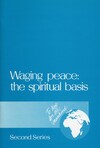

Are you sure?
This bookmark will be removed from all folders and any saved notes will be permanently removed.
PROFILE
Forgiveness in Beirut
When the media report a tragedy that has happened somewhere across the world, far from us, or even in a town nearby, we may yearn to help those involved, but we may also at times feel helpless. A few years ago Margaret Powell, a Christian Scientist, found herself propelled from being an "ordinary person" into the midst of a world news event. And what she learned of the power of prayer and of forgiveness offers a concrete answer to that question "What can I do?" The following is based on a talk she gave to the North Pomfret Congregational Church in Pomfret, Vermont. The church was presenting a series of sermons on forgiveness, and because of her experience the minister invited her to speak.
It was an ordinary day for ordinary people in Pennsylvania, April 18, 1983. It was Monday morning. My husband, Dick, went off to the office, and our son went to his class. But shortly after he left he came back and said, "Mom, the American Embassy in Beirut has been bombed. I just heard it on the radio. You might want to listen to the news."
So I turned on the television, and I watched with horror as the news explained that the American Embassy had indeed been blown up, and the confusion and reports were still coming in. My cousin, who is like a sister, and her husband had been living in Beirut. Bill was with the Agency for International Development with the State Department, and Mary Lee was teaching at the American University in Beirut.
Enjoy 1 free Sentinel article or audio program each month, including content from 1898 to today.
JSH Collections
This article is included in:
1986 - PAMPHLET
Waging peace: the spiritual basis (second series)
JSH-Online has hundreds of pamphlets, anthologies, and special editions for you to discover.

January 20, 1986 issue
View Issue-
The arms race that will bless
MARJORIE MACARTNEY
-
Christian warfare
JEFFREY LACY PLUM
-
PROFILE
MARGARET ESTES POWELL
-
Liberation from tyranny
PATRICIA M. WHITE
-
Spiritual unity and world peace
STEPHEN D. HELMER
-
Christian diplomacy
GODFREY JOHN
-
Watchwords of peace
CAROLYN B. SWAN
-
No river too wide for love to cross
WILLIAM E. MOODY
-
When I was in high school, the choral group I...
LESLIE J. McLEOD-WARRICK
-
I wish to acknowledge joyously and humbly the divine Principle...
WENDY T. MOORHEAD with contributions from JOHN D. MOORHEAD
-
Several years ago, while I was working as a reporter for a local...
CYNTHIA R. GRAY with contributions from STEPHEN T. GRAY
-
When I was a college student, there was a time when I desperately...
RALPH WILLIAM MOORE, JR.


